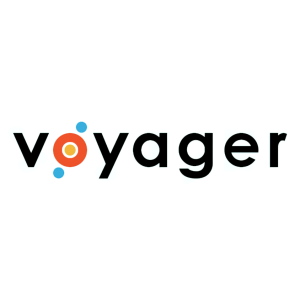Voyager Therapeutics Announces Selection of Development Candidate for GBA1 Program in Collaboration with Neurocrine Biosciences, Triggering Milestone Payment
LEXINGTON, Mass., April 16, 2024 (GLOBE NEWSWIRE) -- Voyager Therapeutics, Inc. (Nasdaq: VYGR), a biotechnology company dedicated to advancing neurogenetic medicines, today announced that the joint steering committee with its collaborator Neurocrine Biosciences has selected a lead development candidate in the GBA1 gene therapy program for the potential treatment of Parkinson’s disease and other GBA1-mediated diseases. The candidate combines a GBA1 gene replacement payload with an intravenously administered, blood-brain barrier penetrant, novel capsid derived from Voyager’s TRACER™ capsid discovery platform. The companies expect to file an Investigational New Drug (IND) application with the FDA for the program in 2025.
Selection of the development candidate triggered a
“The nomination of this development candidate in the GBA1 program, following the recent nomination of a development candidate in the Friedreich’s ataxia program, demonstrates the productivity of the collaboration between Voyager and Neurocrine to advance gene therapies for neurological diseases,” said Alfred W. Sandrock, Jr., M.D., Ph.D., Chief Executive Officer of Voyager. “We now see the potential for three gene therapies leveraging our novel TRACER capsids to enter the clinic in 2025: the Neurocrine-partnered GBA1 and FA programs, and our wholly-owned SOD1 ALS program.”
The GBA1 program is being developed under the 2023 strategic collaboration agreement between Voyager and Neurocrine Biosciences for research, development, manufacture, and commercialization of certain AAV gene therapy products for programs targeting Parkinson’s disease and other GBA1-mediated diseases and three other undisclosed programs to address central nervous system diseases or conditions associated with rare genetic targets. Under the terms of the 2023 collaboration agreement, Voyager is eligible to receive up to
About the TRACER™ Capsid Discovery Platform
Voyager’s TRACER™ (Tropism Redirection of AAV by Cell-type-specific Expression of RNA) capsid discovery platform is a broadly applicable, RNA-based screening platform that enables rapid discovery of AAV capsids with robust penetration of the blood-brain barrier and enhanced central nervous system (CNS) tropism in multiple species, including non-human primates (NHPs). TRACER™ generated capsids have demonstrated superior and widespread gene expression in the CNS compared to conventional AAV capsids as well as cell- and tissue-specific transduction, including to areas of the brain that have been traditionally difficult to reach, while de-targeting the liver and dorsal root ganglia. As part of its external partnership strategy, Voyager has established multiple collaboration agreements providing access to its next-generation TRACER™ capsids to potentially enable its partners’ gene therapy programs to treat a variety of diseases.
About Voyager Therapeutics
Voyager Therapeutics, Inc. (Nasdaq: VYGR) is a biotechnology company dedicated to leveraging the power of human genetics to modify the course of – and ultimately cure – neurological diseases. Our pipeline includes programs for Alzheimer’s disease, amyotrophic lateral sclerosis (ALS), Parkinson’s disease, and multiple other diseases of the central nervous system. Many of our programs are derived from our TRACER™ AAV capsid discovery platform, which we have used to generate novel capsids and identify associated receptors to potentially enable high brain penetration with genetic medicines following intravenous dosing. Some of our programs are wholly owned, and some are advancing with partners including Alexion, AstraZeneca Rare Disease; Novartis Pharma AG; Neurocrine Biosciences, Inc.; and Sangamo Therapeutics, Inc. For more information, visit www.voyagertherapeutics.com.
Voyager Therapeutics® is a registered trademark, and TRACER™ is a trademark, of Voyager Therapeutics, Inc.
Forward-Looking Statements
This press release contains forward-looking statements for the purposes of the safe harbor provisions under The Private Securities Litigation Reform Act of 1995 and other federal securities laws. The use of words such as “expect,” “future,” or “potential,” and other similar expressions are intended to identify forward-looking statements.
For example, all statements Voyager makes regarding filing an IND on the GBA1 program and the potential to advance Voyager’s AAV-based gene therapy programs into the clinic in 2025, and Voyager’s eligibility to receive development and commercial milestone payments, tiered royalties on net sales, and program funding under the 2023 Neurocrine collaboration agreement are forward-looking.
All forward-looking statements are based on estimates and assumptions by Voyager’s management that, although Voyager believes such forward-looking statements to be reasonable, are inherently uncertain. All forward-looking statements are subject to risks and uncertainties that may cause actual results to differ materially from those that Voyager expected. Such risks and uncertainties include, among others, the continued development of Voyager’s technology platforms, including Voyager’s TRACER™ platform and its antibody screening technology; the ability to initiate and conduct preclinical studies in animal models; the development by third parties of capsid identification platforms that may be competitive to Voyager’s TRACER™ capsid discovery platform; Voyager’s ability to create and protect intellectual property rights associated with the TRACER™ capsid discovery platform, the capsids identified by the platform, and development candidates for Voyager’s pipeline programs; the initiation, timing, conduct and outcomes of Voyager’s preclinical studies; the possibility or the timing of Voyager’s receipt of program reimbursement, development or commercialization milestones, option exercise, and other payments under Voyager’s current licensing or collaboration agreements; the ability of Voyager to negotiate and complete licensing or collaboration agreements with other parties on terms acceptable to Voyager and the third parties; the ability to attract and retain talented directors, employees, and contractors; and the sufficiency of cash resources to fund its operations and pursue its corporate objectives.
These statements are also subject to a number of material risks and uncertainties that are described in Voyager’s most recent Annual Report on Form 10-K filed with the Securities and Exchange Commission. All information in the press release is as of the date of this press release, and any forward-looking statement speaks only as of the date on which it was made. Voyager undertakes no obligation to publicly update or revise this information or any forward-looking statement, whether as a result of new information, future events or otherwise, except as required by law.
Contacts
Trista Morrison, NACD.DC, tmorrison@vygr.com
Investors: Adam Bero, Ph.D., abero@kendallir.com
Media: Brooke Shenkin, brooke@scientpr.com








